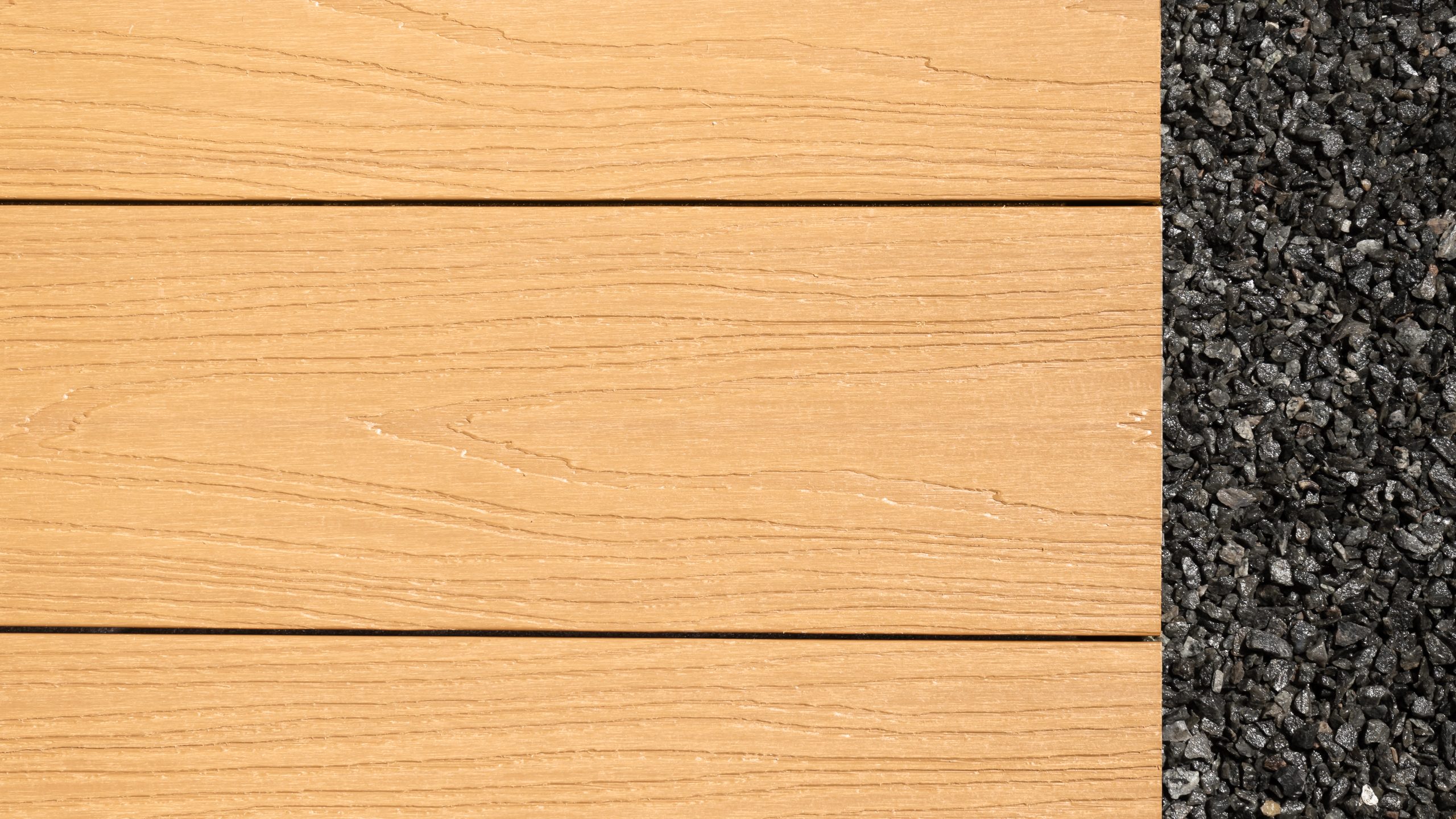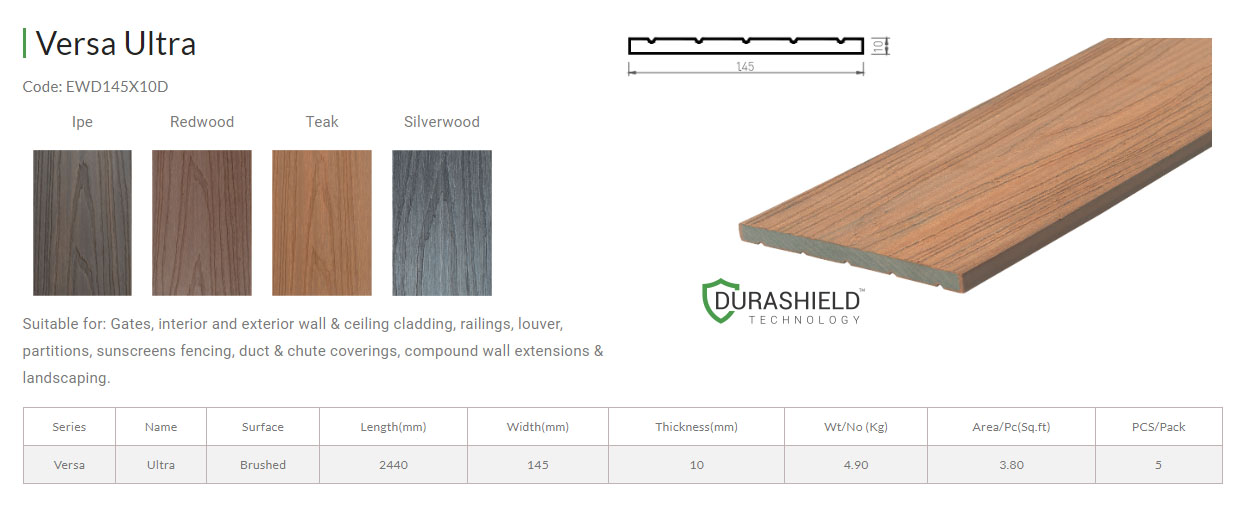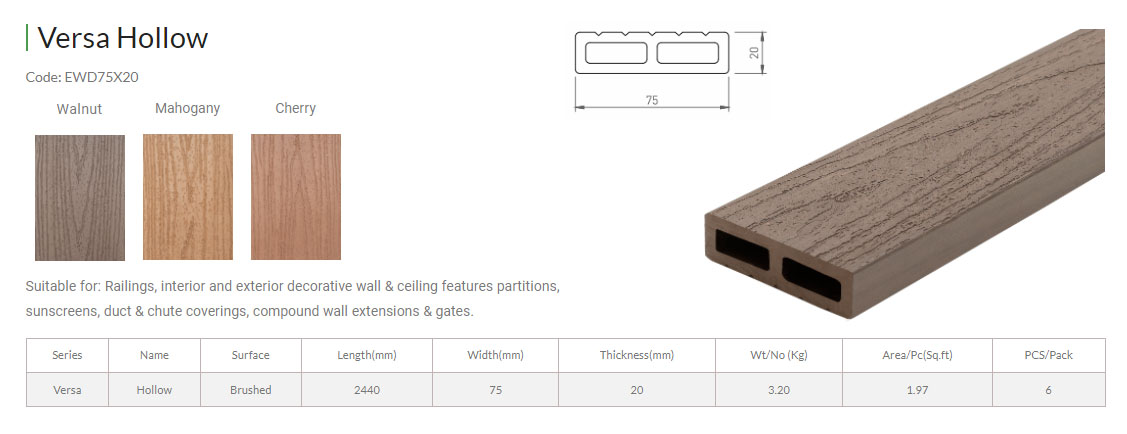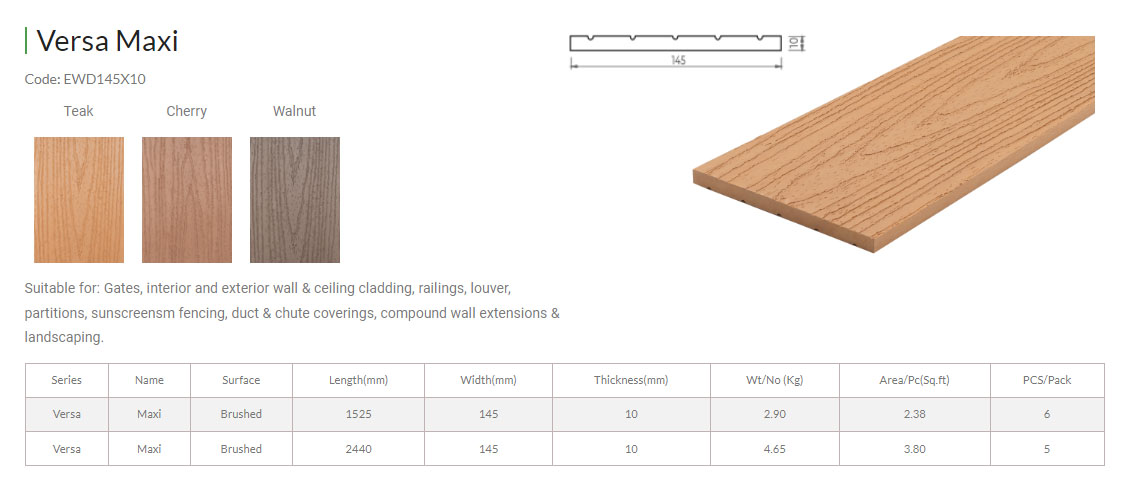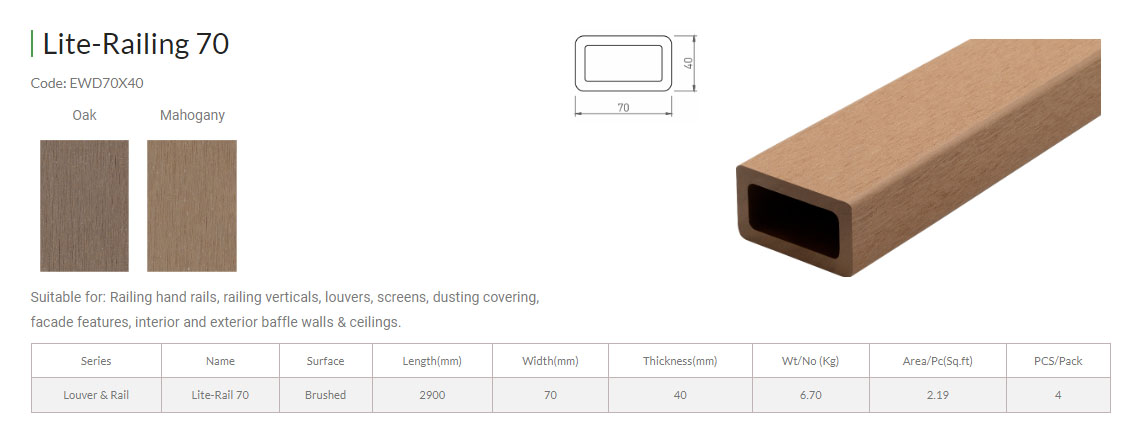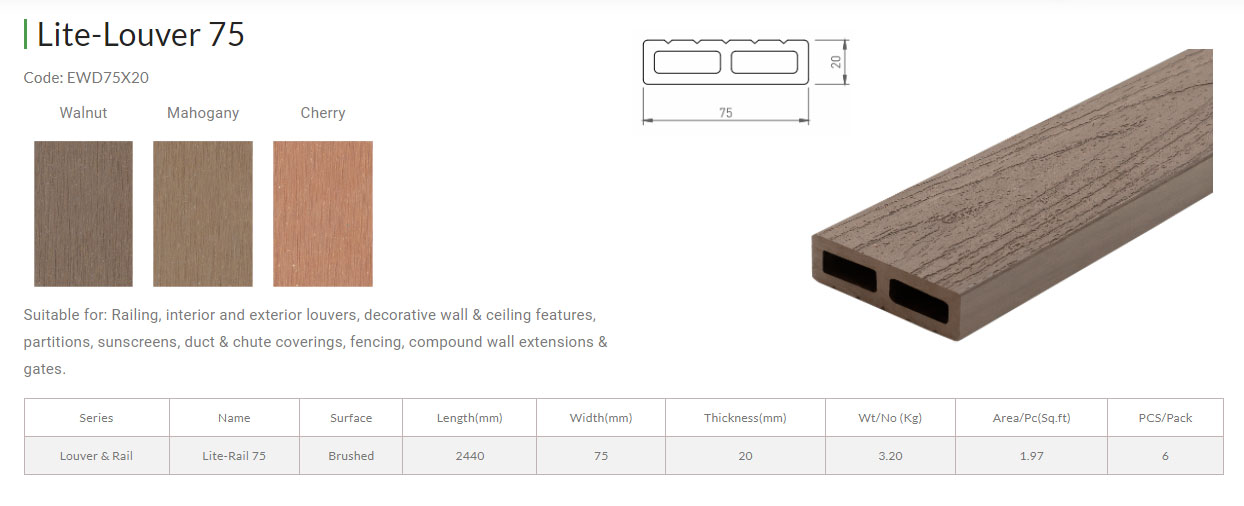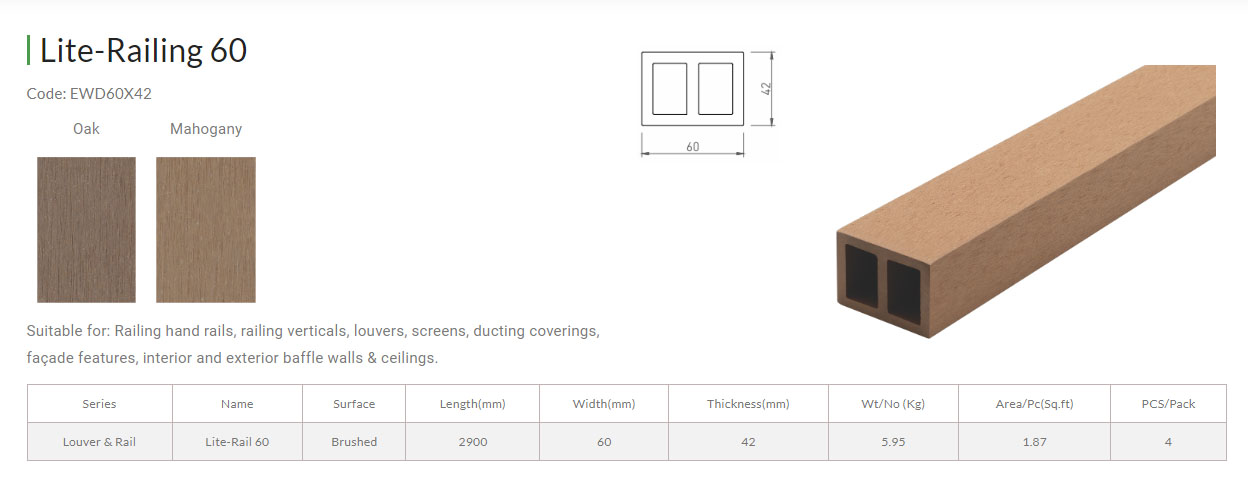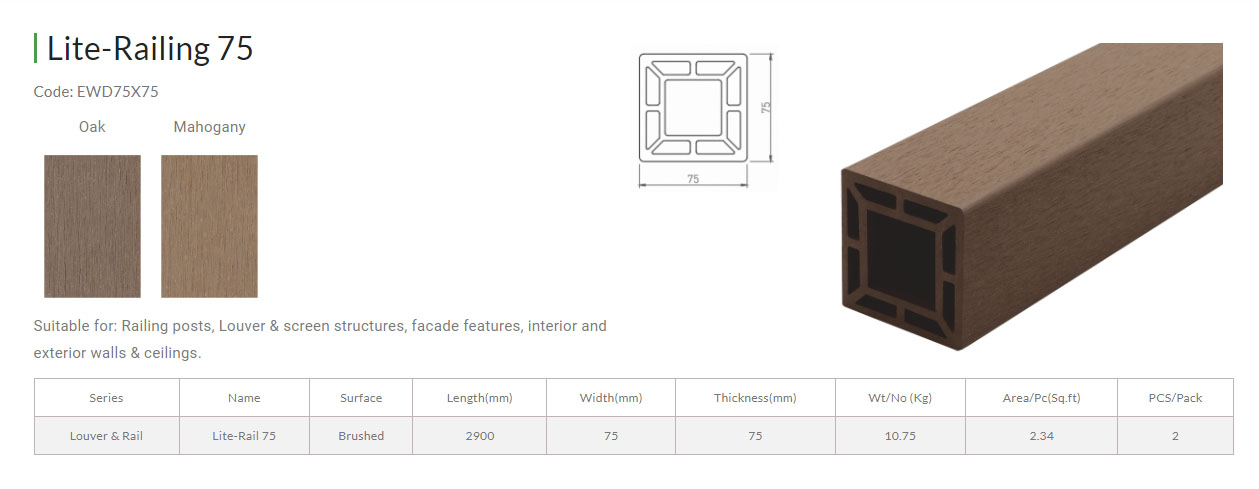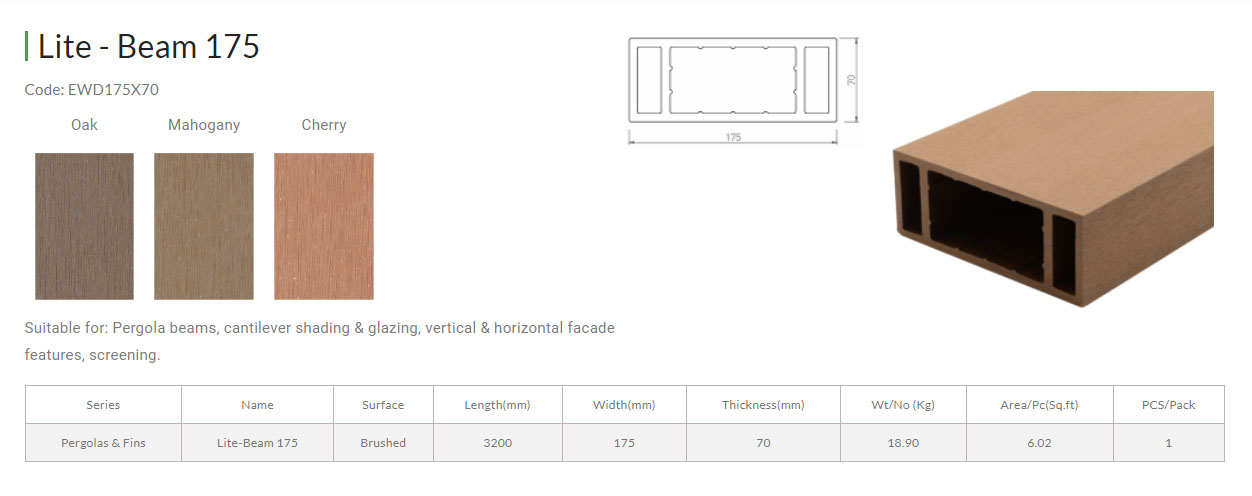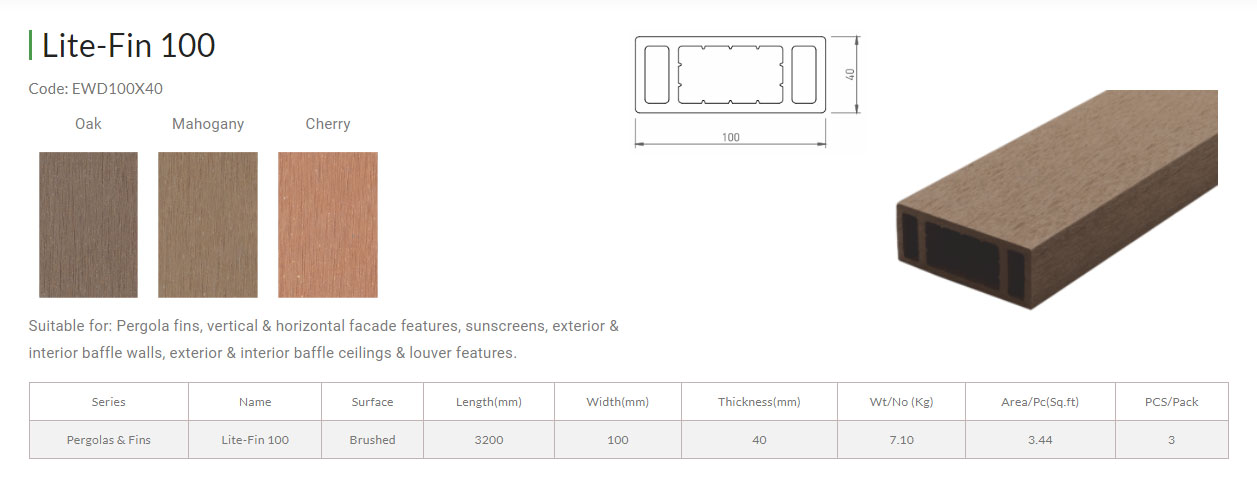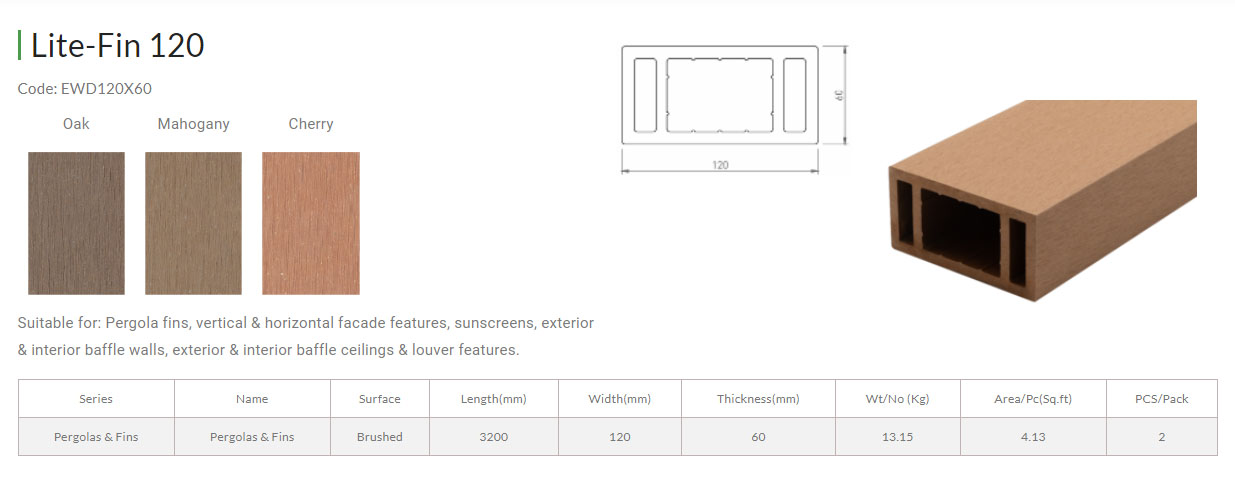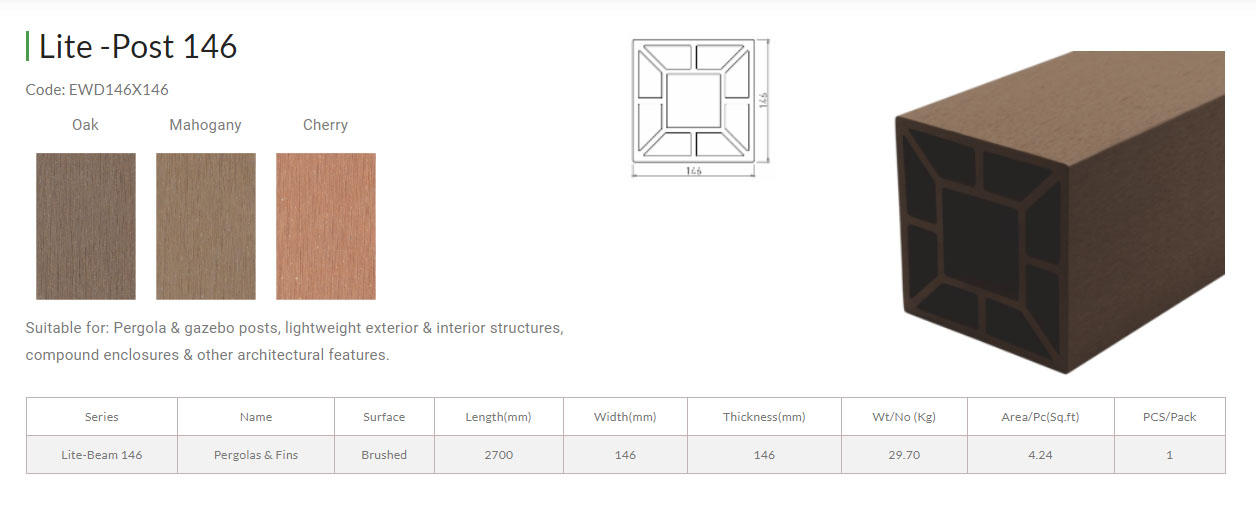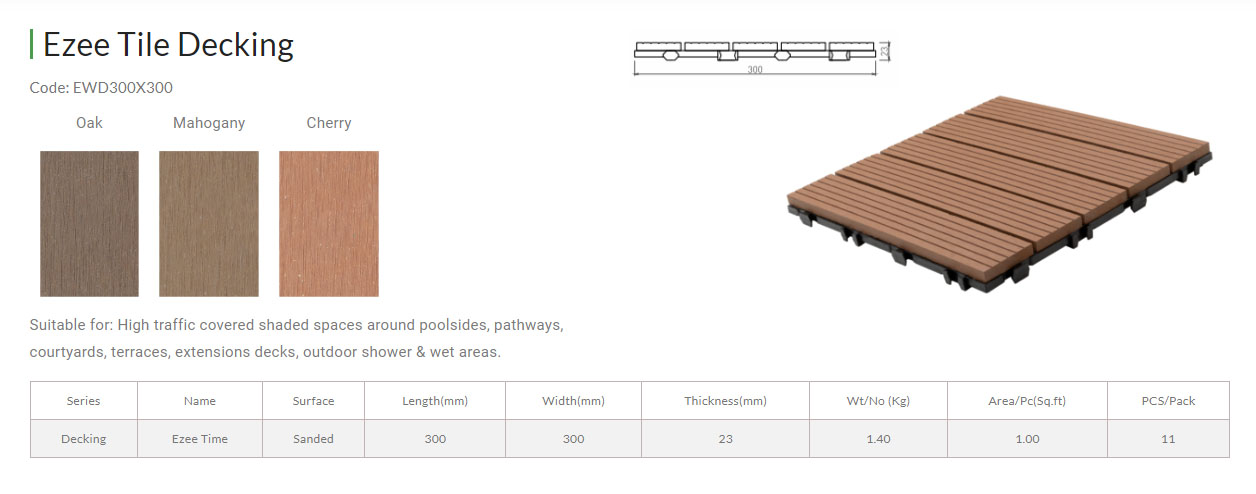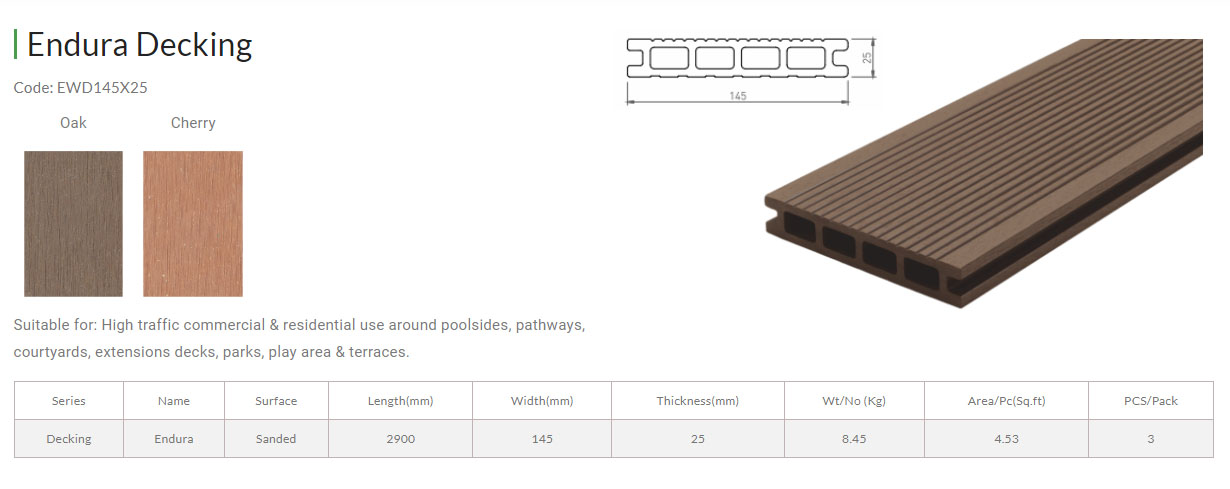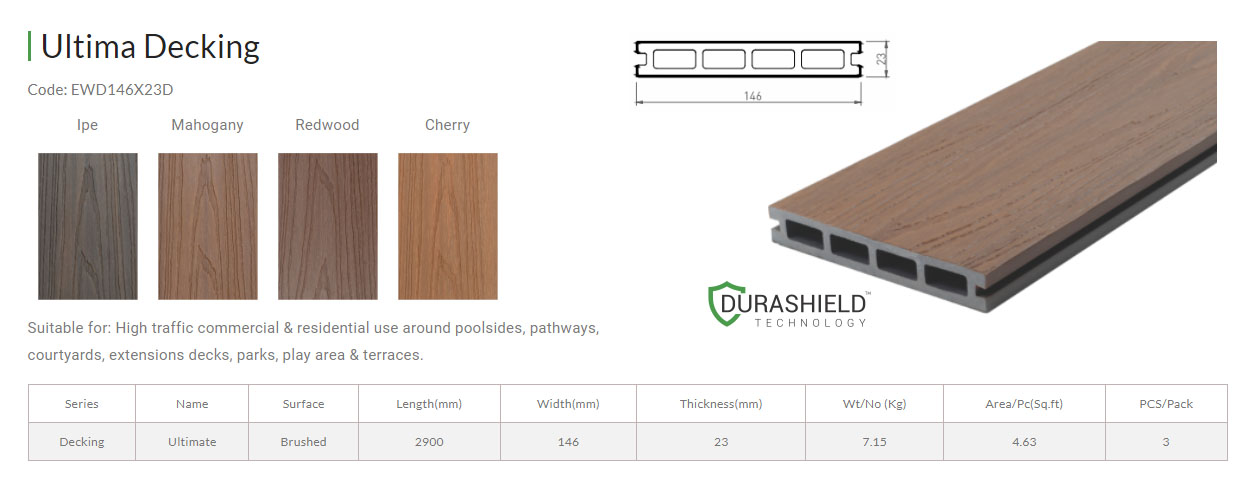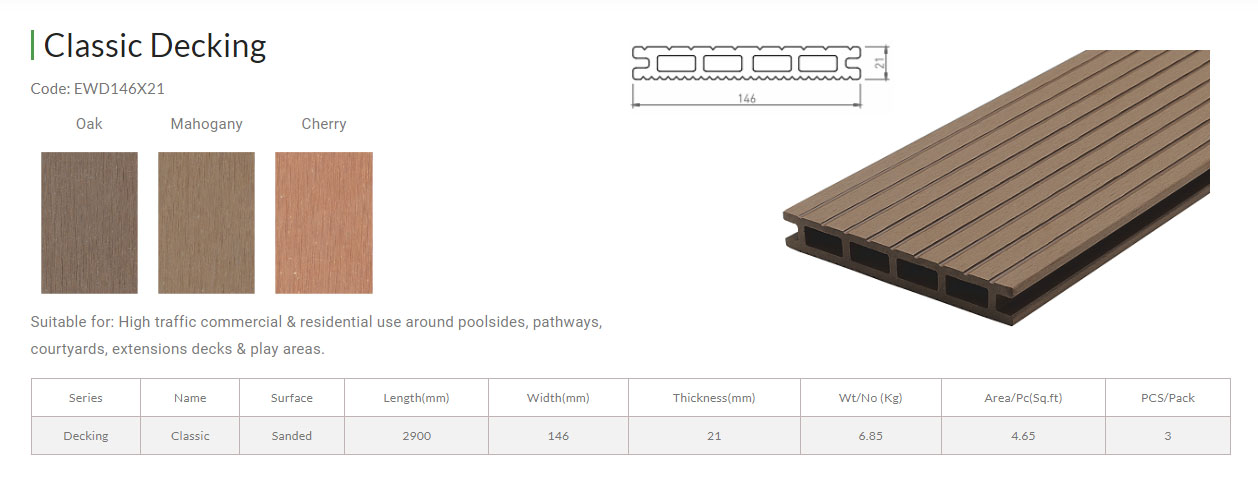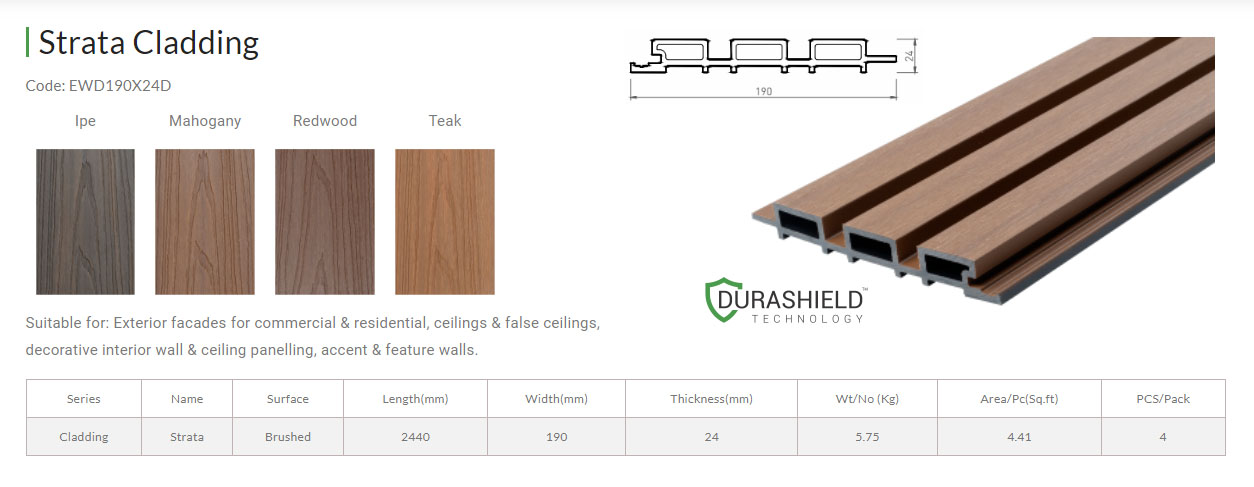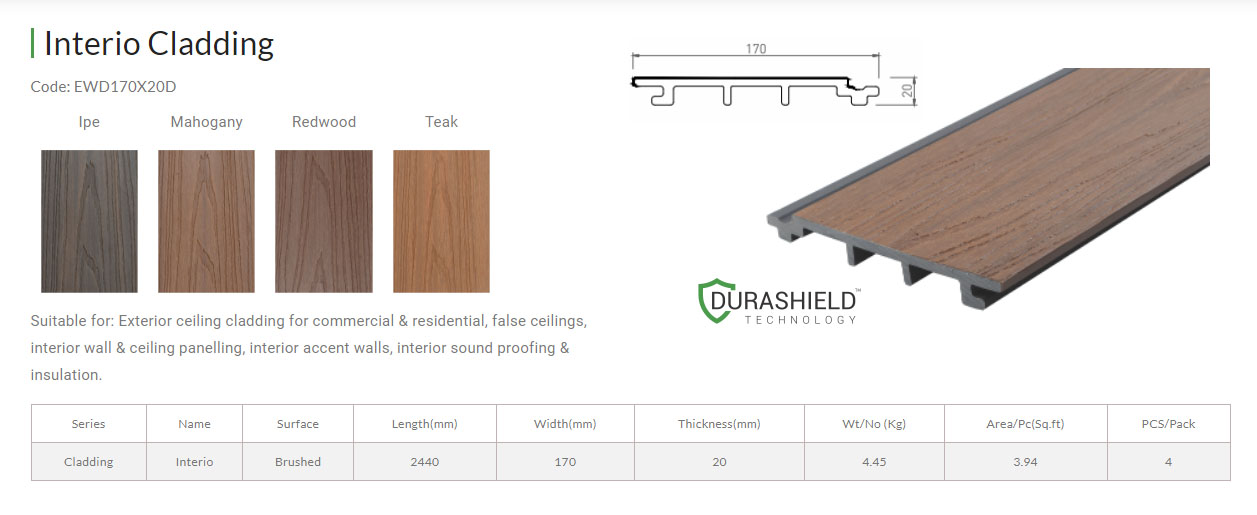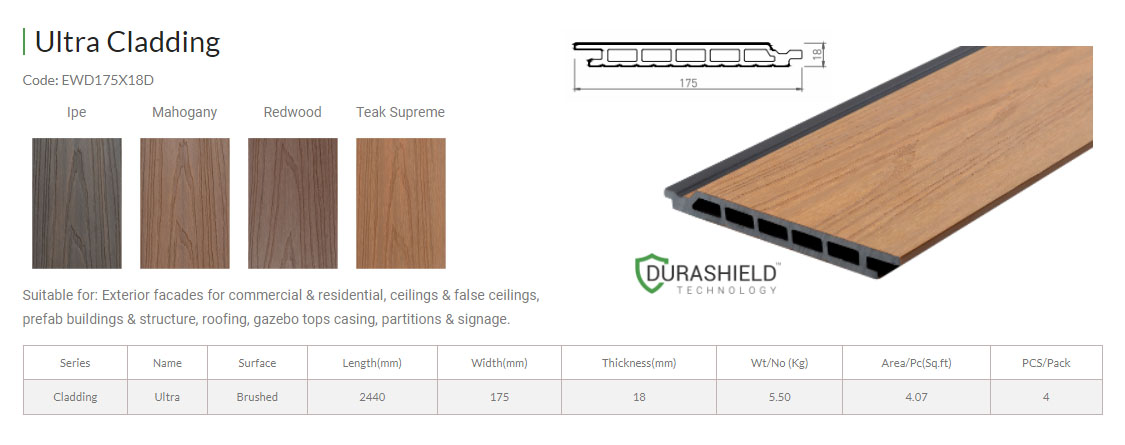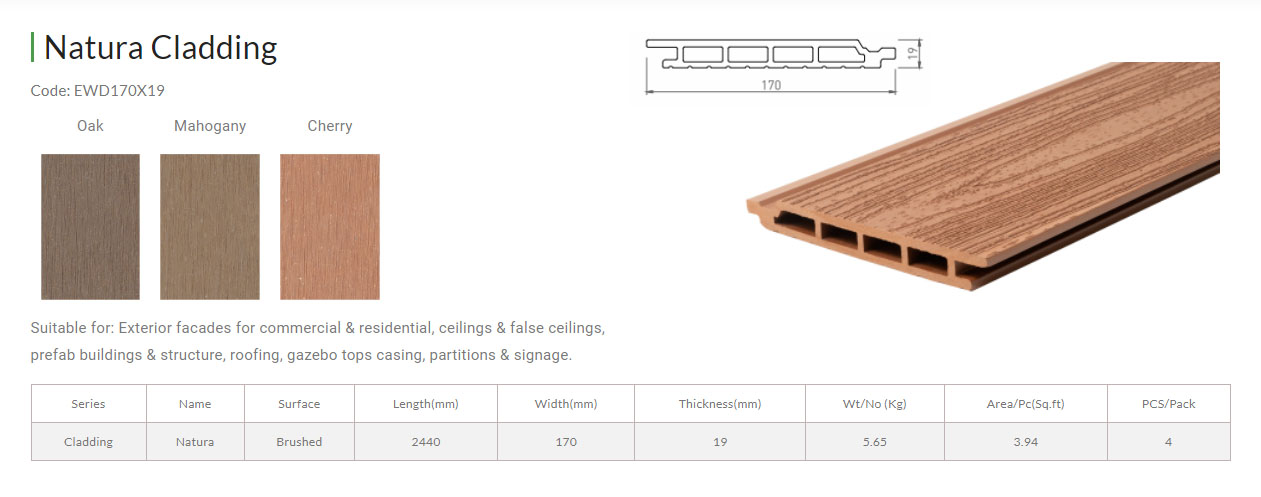What is WPC material?
WPC, or Wood Plastic Composite as it is popularly known, is an exceptionally durable, cost efficient and low environmental impact material with superlative aesthetic appeal and remarkable weathering performance. WPC is a combination of reclaimed wood powder and high density recycled thermoplastics in the ratio of 60%:30%.
What is the difference between WPC and compressed wood?
WPC, or Wood Plastic Composite, is a composite of wood powder and recycled polymers while compressed wood is made from recyclable materials such as small pieces of wood, sawdust and wood shavings, bound together with resin & other bonding agents. WPC is environment friendly as it is manufactured using an eco-friendly production process whereas compressed wood is not so eco-friendly because of the use of resins or other bonding agents.
What is the difference between WPC boards and WPC profiles?
WPC boards are made using compression technology and are available in the form of sheets or boards. They have a density range of 450 to 600 kg/cubic meter. As WPC boards are inherently water resistant, they are used in place of plywood in areas that are exposed to water, i.e., for kitchen cabinets and bathroom cabinets. They also find application in wall cabinet boxes or carcasses. WPC boards are used mostly for interior applications.
On the other hand, WPC profiles are made using extrusion technology and can be manufactured in many shapes and sizes. They are much denser than WPC boards, with density in the range of 1300 to 1450 kg/cubic meter. WPC profiles are therefore much tougher and stronger and are architecturally more application friendly. They can be custom made for any specific application and are highly suitable for exterior applications.
What are the raw materials of WPC and how is it made?
WPC is a combination of reclaimed wood powder and high density recycled thermoplastics in the ratio of 60%:30%, produced through an efficient and clean extrusion manufacturing process that is free of toxic emissions or effluent discharge.
Why is WPC better than other exterior building materials?
Everwood exterior WPC wall cladding panels retain the natural appeal of prefinished wood right through their lifetime. Other exterior building materials such as natural wood cladding, high pressure laminates and cement boards deteriorate in appearance over time. High quality WPC is extremely UV resistant and can withstand heavy sunshine and rain without fading. Everwood WPC does not incur any additional cost towards maintenance as it does not fade, rot, rust or corrode.
Why is WPC better than wood?
WPC resembles wood in appearance but in terms of weathering capability, resistance to UV, termites and rot, it is far superior to wood. Natural wood requires periodic sealing and treatment to protect against fading, cracking, termites and eventually rot. There is absolutely no maintenance or surface coating cost required to keep WPC panels looking good for years.
Does WPC need painting, polish and termite treatment like wood?
One of the most attractive features of WPC is that it does not require any periodic maintenance as does wood or any other conventional building material. The material comes in different shades of natural wood color. Apart from the occasional water washing to remove dust and dirt, WPC does not require any painting, oiling, staining, UV coatings or termite treatment to keep it looking good over time.
What are the key material characteristics of WPC?
Everwood WPC has superior material advantages that make it the ideal material of choice for exterior and interior applications. It carries premium wood looks, has high material strength and extra-long life, and is waterproof, UV resistant and anti-fading, impact resistant, anticorrosive, environment friendly, fire retardant and termite proof.
What is WPC typically used for as a building material?
WPC finds application in wall & ceiling cladding, decking, garden pergolas, terrace pergolas, vertical elevation fins, ventilated facades, baffle features, railings, louvers and a host of other interior and exterior applications.
Why is WPC becoming a popular building material lately?
As a material, WPC is exceptionally durable under all weather conditions. It can withstand heat waves to cold winters, excessive rainfall, highly variable temperatures and intense humidity. WPC also delivers natural wood looks and a premium aesthetic appearance. Most importantly, it does not require any regular maintenance after initial installation. It is a versatile material that can be used in a variety of exterior and interior applications. These inherent attributes have contributed to making WPC a much sought after building material to replace other conventional ones.
Why is WPC environmentally friendly?
WPC is a combination of recycled wood flour and HDPE thermoplastics. Nearly 90% of these raw materials are from secondary sources, which would otherwise be either disposed of in landfills or burnt. The environmental impact during the manufacturing process of WPC is negligible, since manufacture involves consumption of high volume recycled non-toxic raw materials and a production process that is free of toxic emissions or effluent discharge.
Are there good WPC manufacturers and brands in India?
There are several WPC brands available in India. Among them, Everwood WPC has been a pioneer and the leading supplier of premium quality WPC products in India for the last 10 or more years. Everwood WPC has a reputation for supplying premium quality products and has been the preferred choice for the best of architects, project developers, home owners and dealers. Everwood WPC offers multiple solutions for a range of outdoor decking applications. Everwood also offers WPC solutions in wall & ceiling cladding, garden pergolas, terrace pergolas, vertical elevation fins, ventilated facades, baffle features, railings, louvers and a host of other exterior applications.
How long does WPC last and perform well?
With recycled plastics as a key ingredient, good quality WPC has a lifetime of more than 30 years and the inherent characteristics of WPC endow it with excellent tenacity and durability. More importantly, it is recyclable at any point during this time.
Does WPC fade and deteriorate with exposure to weather?
Being a composite of wood and plastics, high quality WPC is extremely UV resistant and can withstand heavy sunshine and rain without fading. Anti-UV additives included with the raw materials during manufacturing ensure that the color of the composite will remain stable and be retained for over 10 years after installation. The polymer content in WPC also makes it waterproof and completely protected against any amount of rainfall or humidity through the lifetime of the material.
Is wood composite a strong material?
The strength and durability of any material depends on its density and the raw material used. As WPC is a composite of wood and polymers, its density and strength are much higher than that of wood. WPC has a higher screw holding capacity, which is an important parameter that defines the strength of a material.
- What is WPC material?
WPC, or Wood Plastic Composite as it is popularly known, is an exceptionally durable, cost efficient and low environmental impact material with superlative aesthetic appeal and remarkable weathering performance. WPC is a combination of reclaimed wood powder and high density recycled thermoplastics in the ratio of 60%:30%.
- What is the difference between WPC and compressed wood?
WPC, or Wood Plastic Composite, is a composite of wood powder and recycled polymers while compressed wood is made from recyclable materials such as small pieces of wood, sawdust and wood shavings, bound together with resin & other bonding agents. WPC is environment friendly as it is manufactured using an eco-friendly production process whereas compressed wood is not so eco-friendly because of the use of resins or other bonding agents.
- What is the difference between WPC boards and WPC profiles?
WPC boards are made using compression technology and are available in the form of sheets or boards. They have a density range of 450 to 600 kg/cubic meter. As WPC boards are inherently water resistant, they are used in place of plywood in areas that are exposed to water, i.e., for kitchen cabinets and bathroom cabinets. They also find application in wall cabinet boxes or carcasses. WPC boards are used mostly for interior applications.
On the other hand, WPC profiles are made using extrusion technology and can be manufactured in many shapes and sizes. They are much denser than WPC boards, with density in the range of 1300 to 1450 kg/cubic meter. WPC profiles are therefore much tougher and stronger and are architecturally more application friendly. They can be custom made for any specific application and are highly suitable for exterior applications.
- What are the raw materials of WPC and how is it made?
WPC is a combination of reclaimed wood powder and high density recycled thermoplastics in the ratio of 60%:30%, produced through an efficient and clean extrusion manufacturing process that is free of toxic emissions or effluent discharge.
- Why is WPC better than other exterior building materials?
Everwood exterior WPC wall cladding panels retain the natural appeal of prefinished wood right through their lifetime. Other exterior building materials such as natural wood cladding, high pressure laminates and cement boards deteriorate in appearance over time. High quality WPC is extremely UV resistant and can withstand heavy sunshine and rain without fading. Everwood WPC does not incur any additional cost towards maintenance as it does not fade, rot, rust or corrode.
- Why is WPC better than wood?
WPC resembles wood in appearance but in terms of weathering capability, resistance to UV, termites and rot, it is far superior to wood. Natural wood requires periodic sealing and treatment to protect against fading, cracking, termites and eventually rot. There is absolutely no maintenance or surface coating cost required to keep WPC panels looking good for years.
- Does WPC need painting, polish and termite treatment like wood?
One of the most attractive features of WPC is that it does not require any periodic maintenance as does wood or any other conventional building material. The material comes in different shades of natural wood color. Apart from the occasional water washing to remove dust and dirt, WPC does not require any painting, oiling, staining, UV coatings or termite treatment to keep it looking good over time.
- What are the key material characteristics of WPC?
Everwood WPC has superior material advantages that make it the ideal material of choice for exterior and interior applications. It carries premium wood looks, has high material strength and extra-long life, and is waterproof, UV resistant and anti-fading, impact resistant, anticorrosive, environment friendly, fire retardant and termite proof.
- What is WPC typically used for as a building material?
WPC finds application in wall & ceiling cladding, decking, garden pergolas, terrace pergolas, vertical elevation fins, ventilated facades, baffle features, railings, louvers and a host of other interior and exterior applications.
- Why is WPC becoming a popular building material lately?
As a material, WPC is exceptionally durable under all weather conditions. It can withstand heat waves to cold winters, excessive rainfall, highly variable temperatures and intense humidity. WPC also delivers natural wood looks and a premium aesthetic appearance. Most importantly, it does not require any regular maintenance after initial installation. It is a versatile material that can be used in a variety of exterior and interior applications. These inherent attributes have contributed to making WPC a much sought after building material to replace other conventional ones.
- Why is WPC environmentally friendly?
WPC is a combination of recycled wood flour and HDPE thermoplastics. Nearly 90% of these raw materials are from secondary sources, which would otherwise be either disposed of in landfills or burnt. The environmental impact during the manufacturing process of WPC is negligible, since manufacture involves consumption of high volume recycled non-toxic raw materials and a production process that is free of toxic emissions or effluent discharge.
- Are there good WPC manufacturers and brands in India?
There are several WPC brands available in India. Among them, Everwood WPC has been a pioneer and the leading supplier of premium quality WPC products in India for the last 10 or more years. Everwood WPC has a reputation for supplying premium quality products and has been the preferred choice for the best of architects, project developers, home owners and dealers. Everwood WPC offers multiple solutions for a range of outdoor decking applications. Everwood also offers WPC solutions in wall & ceiling cladding, garden pergolas, terrace pergolas, vertical elevation fins, ventilated facades, baffle features, railings, louvers and a host of other exterior applications.
- How long does WPC last and perform well?
With recycled plastics as a key ingredient, good quality WPC has a lifetime of more than 30 years and the inherent characteristics of WPC endow it with excellent tenacity and durability. More importantly, it is recyclable at any point during this time.
- Does WPC fade and deteriorate with exposure to weather?
Being a composite of wood and plastics, high quality WPC is extremely UV resistant and can withstand heavy sunshine and rain without fading. Anti-UV additives included with the raw materials during manufacturing ensure that the color of the composite will remain stable and be retained for over 10 years after installation. The polymer content in WPC also makes it waterproof and completely protected against any amount of rainfall or humidity through the lifetime of the material.
- Is wood composite a strong material?
The strength and durability of any material depends on its density and the raw material used. As WPC is a composite of wood and polymers, its density and strength are much higher than that of wood. WPC has a higher screw holding capacity, which is an important parameter that defines the strength of a material.


